
Turning the other cheek is a phrase in Christian doctrine from the Sermon on the Mount that refers to responding to insult without retort. This passage is variously interpreted as accepting one's predicament, commanding nonresistance or advocating Christian pacifism.

Matthew 5 is the fifth chapter of the Gospel of Matthew in the New Testament. It contains the first portion of the Sermon on the Mount, the other portions of which are contained in chapters 6 and 7. Portions are similar to the Sermon on the Plain in Luke 6, but much of the material is found only in Matthew. It is one of the most discussed and analyzed chapters of the New Testament. Warren Kissinger reports that among early Christians, no chapter was more often cited by early scholars. The same is true in modern scholarship.

Matthew 5:25 is the twenty-fifth verse of the fifth chapter of the Gospel of Matthew in the New Testament and is part of the Sermon on the Mount. In this first of the 6 Antitheses Jesus has been attacking anger and advocating reconciliation. In this verse he states that it is prudential to quickly reach agreement with one's adversary.

Matthew 5:26 is the twenty-sixth verse of the fifth chapter of the Gospel of Matthew in the New Testament and is part of the Sermon on the Mount. Jesus has just warned that if you do not reconcile with your enemies a judge is likely to throw you in jail. In this verse Jesus mentions that your debts must be paid completely before one can leave.

Matthew 5:33 is the thirty-third verse of the fifth chapter of the Gospel of Matthew in the New Testament and is part of the Sermon on the Mount. This verse is the opening of the fourth antithesis, beginning the discussion of oaths.

Matthew 5:40 is the fortieth verse of the fifth chapter of the Gospel of Matthew in the New Testament and is part of the Sermon on the Mount. This is the third verse of the antithesis on the commandment: "Eye for an eye".
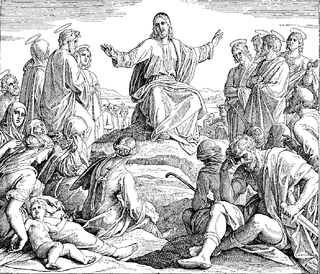
Matthew 5:43 is the forty-third verse of the fifth chapter of the Gospel of Matthew in the New Testament and is part of the Sermon on the Mount. This verse is the opening of the final antithesis, that on the commandment to "Love thy neighbour as thyself".

Matthew 5:44, the forty-fourth verse in the fifth chapter of the Gospel of Matthew in the New Testament, also found in Luke 6:27–36, is part of the Sermon on the Mount. This is the second verse of the final antithesis, that on the commandment to "Love thy neighbour as thyself". In the chapter, Jesus refutes the teaching of some that one should "hate [one's] enemies".

Matthew 5:46 is the forty-sixth verse of the fifth chapter of the Gospel of Matthew in the New Testament and is part of the Sermon on the Mount. This is the third verse of the final antithesis, built on the commandment "Love thy neighbour as thyself". Jesus here gives another example of why one must love one's enemies.
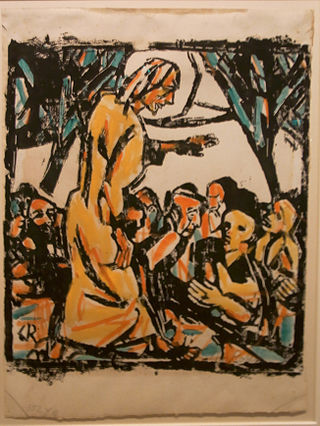
Matthew 5:47 is the forty-seventh verse of the fifth chapter of the Gospel of Matthew in the New Testament and is part of the Sermon on the Mount. This is the third verse of the final antithesis, that on the commandment: "Love thy neighbour as thyself". Jesus here gives another example of why one must love one's enemies.

Matthew 6:3 is the third verse of the sixth chapter of the Gospel of Matthew in the New Testament and is part of the Sermon on the Mount. This verse continues the discussion of how one should give to charity.

Matthew 6:17 is the seventeenth verse of the sixth chapter of the Gospel of Matthew in the New Testament and is part of the Sermon on the Mount. This verse continues the discussion of fasting.
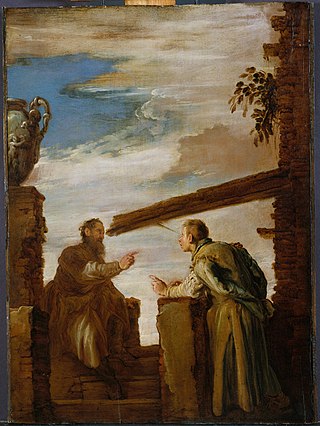
Matthew 7:3 is the third verse of the seventh chapter of the Gospel of Matthew in the New Testament and is part of the Sermon on the Mount. This verse continues Jesus' warnings addressed to those who judge others.

Matthew 7:4 is the fourth verse of the seventh chapter of the Gospel of Matthew in the New Testament and is part of the Sermon on the Mount. This verse continues the discussion of judgmentalism.
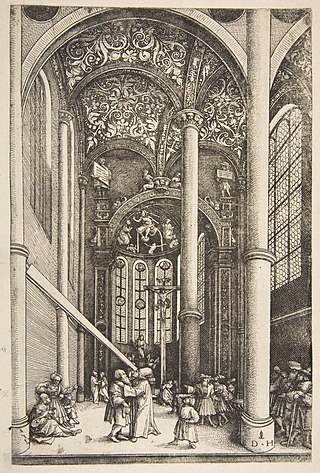
Matthew 7:5 is the fifth verse of the seventh chapter of the Gospel of Matthew in the New Testament and is part of the Sermon on the Mount. This verse continues the discussion of judgmentalism.

Luke 6 is the sixth chapter of the Gospel of Luke in the New Testament of the Christian Bible, traditionally attributed to Luke the Evangelist, a companion of Paul the Apostle on his missionary journeys. Jesus' teaching about the Sabbath enrages the religious authorities and deepens their conflict. The selection of twelve apostles is recounted and this is followed by the "Sermon on the Plain", where key aspects of Jesus' teaching are presented.

"The pot calling the kettle black" is a proverbial idiom that may be of Spanish origin, of which English versions began to appear in the first half of the 17th century. It means a situation in which somebody accuses someone else of a fault which the accuser shares, and therefore is an example of psychological projection, or hypocrisy. Use of the expression to discredit or deflect a claim of wrongdoing by attacking the originator of the claim for their own similar behaviour is the tu quoque logical fallacy.
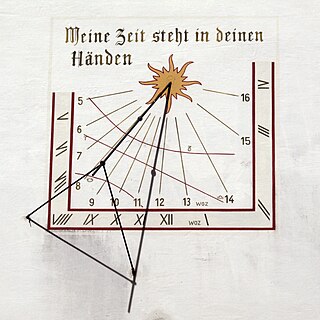
Psalm 31 is the 31st psalm of the Book of Psalms, beginning in English in the King James Version: "In thee, O LORD, do I put my trust". In Latin, it is known as "In te Domine speravi". The Book of Psalms is part of the third section of the Hebrew Bible, and a book of the Christian Old Testament. In the slightly different numbering system used in the Greek Septuagint version of the Bible, and in its Latin translation, the Vulgate, this psalm is Psalm 30. The first verse in the Hebrew text indicates that it was composed by David.
Brotherly love in the biblical sense is an extension of the natural affection associated with near kin, toward the greater community of fellow believers, that goes beyond the mere duty in Leviticus 19:18 to "love thy neighbour as thyself", and shows itself as "unfeigned love" from a "pure heart", that extends an unconditional hand of friendship that loves when not loved back, that gives without getting, and ever looks for what is best in others.
Physician, heal thyself, sometimes quoted in the Latin form, Medice, cura te ipsum, is an ancient proverb appearing in Luke 4:23. There, Jesus is quoted as saying, "Ye will surely say unto me this proverb, 'Physician, heal thyself': whatsoever we have heard done in Capernaum, do also here in thy country." Commentators have pointed out the echo of similar skepticism in the taunts that Jesus would ultimately hear while hanging on the cross: "He saved others; himself he cannot save". The shortened Latin form of the proverb, Medice, cura te ipsum, was made famous through the Latin translation of the Bible, the Vulgate, and so gained currency across Europe.



















